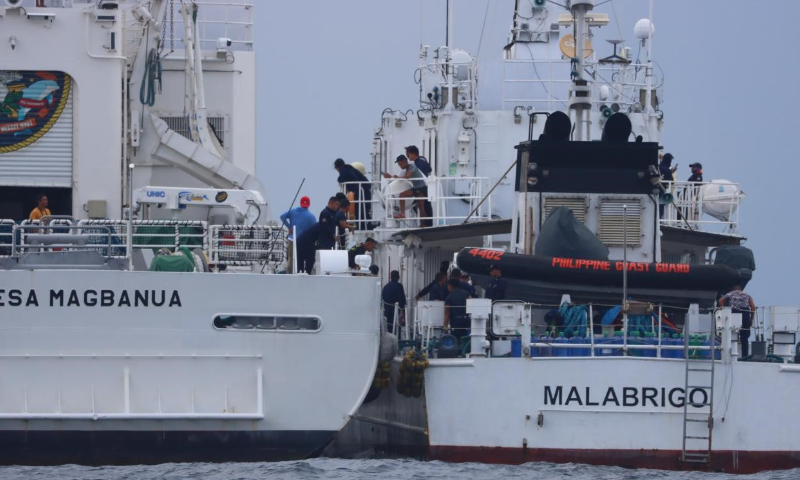
The photo taken on May 9 shows the Philippine ships 4402 and 9701 are transferring personnel and supplies in the waters of China's Xianbin Jiao. Photo: China Coast Guard
Since April, the Philippine Coast Guard's
BRP Teresa Magbanua (MRRV-9701) has been illegally anchored in the lagoon of Xianin Jiao in the South China Sea, with the intention of substantially advancing the construction of a "forward base" on Xianbin Jiao to form a semi-permanent floating platform and to achieve illegal "grounding."
The Nansha Islands, including Xianbin Jiao, are China's inherent territory. China has indisputable sovereignty over the Nansha Islands, which brooks no infringement. The scientific survey conducted by China this year shows that Xianbin Jiao is a typical high-water plateau. The report, released on August 30, used sufficient scientific facts to show that the six sandbanks on the Xianbin Jiao plateau were all naturally formed, and three of them emerged from the sea at high tide.
The signal sent by this position is very clear: There is no doubt that Xianbin Jiao has internal waters, a territorial sea and a contiguous zone. There are sufficient international and domestic laws to support any form of enforcement against the illegally stationed Philippine ships at Xianbin Jiao. The measures taken by the Chinese side to block the Philippine side's transportation, replenishment and rotation are rational, restrained and fair. In fact, China has the means to resolutely and thoroughly remove illegal vessels, barge vessels and aircraft infringing on its airspace. If the Philippines does not immediately withdraw the illegally vessels, it will bare all the consequences.
At the same time, China has made clear its position on many international occasions and platforms that it must resolutely uphold the seriousness of the Declaration on the Conduct of Parties in the South China Sea.
Article 5 of the Declaration on the Conduct of Parties in the South China Sea (DOC), signed by China and ASEAN countries in 2002, stipulates that the parties undertake to exercise self-restraint in the conduct of activities that would complicate or escalate disputes and affect peace and stability including, among others, refraining from action of inhabiting on the presently uninhabited islands, reefs, shoals, cays, and other features and to handle their differences in a constructive manner.
The Philippines' recent actions represent a serious breach of its commitments. The series of actions taken by the Philippines constitute a malicious provocation to the status quo of peace in the South China Sea, undermining both international and regional order and betraying its commitments to neighbors and partners.
More importantly, the China-Philippines Bilateral Consultation Mechanism on the South China Sea has held nine rounds. On July 2, the two sides reached a joint commitment to de-escalate the situation at sea. However, at Xianbin Jiao, the Philippines has not adhered to the tacit understanding and commitments reached, instead engaging in extremely dangerous provocations and brinkmanship. The Philippines wants to use the South China Sea issue to engage in geopolitical speculation and to draw in countries outside the region by provoking maritime tensions. More specifically, the Philippines is testing the limits of what the US is willing to do as an ally.
The Philippines' move fully exposes its ambition to provoke and expand territory in the South China Sea. China has stated many times that it will never allow the Philippines to arbitrarily occupy Xianbin Jiao. Any provocations by the Philippines will be met with firm countermeasures from China.
The Philippines should not underestimate the high costs that will inevitably arise from challenging China and undermining regional security, nor should it assume that it has the backing of major powers. For the Philippines, the only correct choice is to immediately withdraw its ships and personnel, and restore the status of no presence or facilities at Xianbin Jiao.
The author is deputy director of the Institute of Maritime Strategy Studies at China Institutes of Contemporary International Relations. opinion@globaltimes.com.cn




